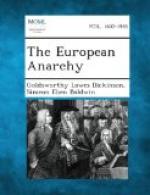The text of the treaty of 1894 between France and Russia has never been published. It is supposed to be a treaty of mutual defence in case of an aggressive attack. The Power from whom attack is expected is probably named, as in the treaty between Germany and Austria. It is probably for that reason that the treaty was not published. The accession of Great Britain to what then became known as the “Triple Entente” is determined by the treaty of 1904 with France, whereby France abandoned her opposition to the British occupation of Egypt in return for a free hand in Morocco; and by the treaty of 1907 with Russia, whereby the two Powers regulated their relations in Persia, Afghanistan, and Thibet. There is no mention in either case of an attack, or a defence against attack, by any other Power.]
[Footnote 2: These were published by the Norddeutsche Allgemeine Zeitung, and are reprinted under the title “Belgische Aktenstuecke,” 1905-14 (Ernst Siegfried Mittler and Sons, Berlin). Their authenticity, as far as I know, has not been disputed. On the other hand, it is to be assumed that they have been very carefully “edited” by the German to make a particular impression. My view of the policy of Germany or of the Entente is in no sense based upon them. I adduce them as evidence of contemporary feeling and opinion.]
3. Great Britain.
Having established this general fact that a state of mutual suspicion and fear prevailed between Germany and the Powers of the Triple Entente, let us next consider the positions and purposes of the various States involved. First, let us take Great Britain, of which we ought to know most. Great Britain is the head of an Empire, and of one, in point of territory and population, the greatest the world has ever seen. This Empire has been acquired by trade and settlement, backed or preceded by military force. And to acquire and hold it, it has been necessary to wage war after war, not only overseas but on the continent of Europe. It is, however, as we have already noticed, a fact, and a cardinal fact, that since the fifteenth century British ambitions have not been directed to extending empire over the continent of Europe. On the contrary, we have resisted by arms every attempt made by other Powers in that direction. That is what we have meant by maintaining the “balance of power.” We have acted, no doubt, in our own interest, or in what we thought to be such; but in doing so we have made ourselves the champions of those European nations that have been threatened by the excessive power of their neighbours. British imperialism has thus, for four centuries, not endangered but guaranteed the independence of the European States. Further, our Empire is so large that we can hardly extend it without danger of being unable to administer and protect it. We claim, therefore, that we have neither the need nor the desire to wage wars of conquest. But we ought not to be surprised if




